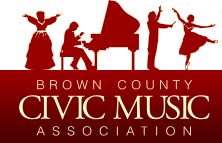Season Listing | Program | Program Notes | Biography | Video
Johann Sebastian Bach Suite from Goldberg Variations, BWV 988
The story goes that the Goldberg Variations were written for Johann Gottlieb Goldberg, the young private harpsichordist of the Dresdener Count Herman von Kayserlinck to sooth his sleepless nights. However this is generally considered to be heresy, due to the fact that the music is very virtuosic and Goldberg could not have been older than fourteen at the time of writing.
In the arrangement for reed quintet a specific detail of the piece becomes clear; Bach wrote it for an instrument with two manuals, on which the crossing of the hands (thus of the voices) was much easier than on a regular keyboard instrument. These crossing of voices are more apparent in Calefax’s arrangement because of the differences in tonal colour of the various reed instruments.
Edvard Grieg (1843 – 1907) – Aus Holberg’s Zeit
Edvard Grieg wrote his piano suite “From Holberg’s time” for the bicentenary of the Danish/Norwegian playwright Ludvig Holberg (1684-1754). The piece follows the design of a French baroque dance suite, but then in romantic fashion. Grieg’s later version, for string orchestra, became immensely popular. In the arrangement for reed quintet, Raaf Hekkema happily uses both sources; the sonority of the string orchestra is similar to that of the reed quintet, whereas here and there the transparency of the original is being preferred.
Libro de glosas is based on the Trattado de glosas from Diego Ortiz (1510-ca1570). The “inter-textuality” between different materials and musical techniques and process of the XVIst century music was my principal interest when I wrote this piece for the wonderful sound and quality of the Calefax ensemble. The piece consists of four Recercadas (I-IV) and a Batalla (V).
The parts I, II und V were performed in Den Bosch at December, 16th 2007. The wohle ciclus was premiered in September 6th 2008 in Utrecht (Old Music Festival). The piece is dedicated to Calefax. The intertextual relationships are as follows:
Recercada I is based on the first chords of the chanson “Doulce memoire“ von Pierre Sandrin. It is also used by Diego Ortiz in his Trattado de glosas.
Recercada II is based on the Incipit of the Madrigal “O felici occhi miei“ of Jacques Arcadelt. It is also used in Trattado de glosas.
Recercada III ist based on the ostinato “Passamezzo antico”. It is also used in Trattado de glosas.
Recercada IV is based on the tenor “La Spagna”. It is also present in Tratado de glosas.
Batalla (V) is a free composition in the form of a “battaglia” and is based on some ostinati of spanish origin as well as on an anonymous thema (XVIst century). There are also some bars of a batalla from Joseph Ximénez (XVIIIrd century).
La spagna – or, in full, “Il re de Spagna”- is a melody which was profusely improvised upon during the 15th century. In the “basse danse”, instruments – usually the shawm – swarmed in a bristling improvisation around a slower melody. Only a few anonymous composers, however, recorded this style. Here the clarinet plays “La Spagna”; the use of the cor anglais adds to the ensemble’s dark sound color.
text by Alban Wesly



